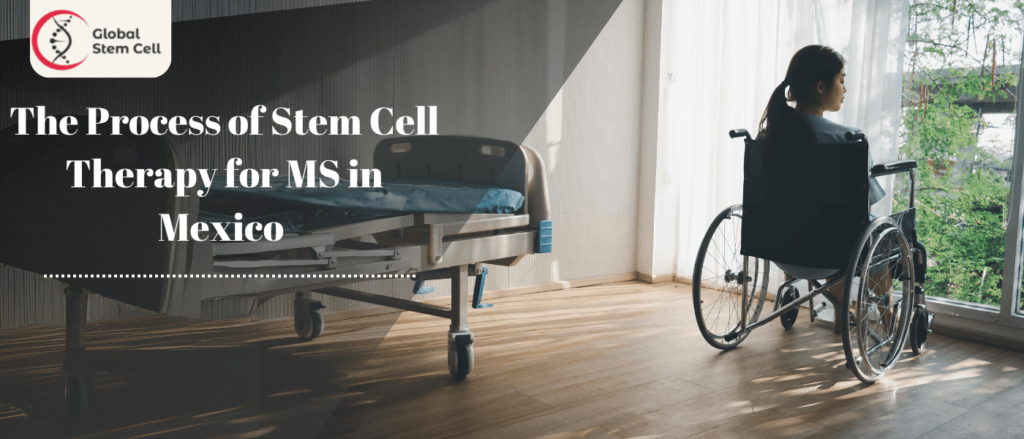
Multiple Sclerosis (MS) is a chronic and often disabling disease that affects the central nervous system, leading to a range of symptoms including fatigue, mobility issues, and cognitive impairment. Traditional treatments for MS have focused on managing symptoms and slowing the progression of the disease, but they do not offer a cure.
However, recent advancements in stem cell therapy have opened up new avenues for treatment, offering hope to those living with MS. Mexico has emerged as a popular destination for stem cell therapy due to its advanced medical facilities, experienced practitioners, and cost-effective treatment options.
This blog post provides a detailed overview of stem cell therapy for Multiple Sclerosis in Mexico, exploring the process, benefits, costs, and what patients can expect.
Understanding Multiple Sclerosis
Multiple Sclerosis is an autoimmune disease in which the immune system attacks the protective sheath (myelin) that covers nerve fibers, leading to communication problems between the brain and the rest of the body. Eventually, the disease can cause permanent damage or deterioration of the nerves themselves.
The symptoms of MS vary widely depending on the amount of nerve damage and which nerves are affected. Some people with severe MS may lose the ability to walk independently or at all, while others may experience long periods of remission without any new symptoms.
Traditional Treatments for MS
The current standard of care for MS includes disease-modifying therapies (DMTs) that aim to reduce the frequency and severity of relapses, slow the progression of the disease, and manage symptoms.
These treatments include medications such as interferons, monoclonal antibodies, and oral medications. While these treatments can be effective in managing the disease, they do not offer a cure and often come with significant side effects.
What is Stem Cell Therapy?
Stem cell therapy is a form of regenerative medicine that utilizes the body’s own stem cells to repair and regenerate damaged tissues. Stem cells are unique because they have the ability to develop into different types of cells in the body, including nerve cells, muscle cells, and blood cells. This makes them particularly valuable in treating diseases like MS, where nerve damage is a primary concern.
How Stem Cell Therapy Works for MS
Table of Content
Stem cell therapy for MS typically involves harvesting stem cells from the patient’s own body (autologous stem cells) or from a donor (allogeneic stem cells). These stem cells are then processed and injected back into the patient’s body to help repair the damaged myelin sheath around the nerves.
There are two main types of stem cell therapy used for MS:
- Hematopoietic Stem Cell Transplantation (HSCT): This involves harvesting hematopoietic stem cells from the patient’s bone marrow or blood. The patient then undergoes a process of chemotherapy to wipe out the existing immune system. The harvested stem cells are then reintroduced into the patient’s body to rebuild the immune system. The goal is to reset the immune system so that it no longer attacks the myelin sheath.
- Mesenchymal Stem Cell Therapy (MSC): Mesenchymal stem cells are harvested from the patient’s bone marrow or adipose (fat) tissue. These cells have anti-inflammatory properties and can help repair damaged tissues. MSC therapy is less aggressive than HSCT and does not involve chemotherapy. It is primarily used to reduce inflammation and promote healing in the nervous
Why Choose Mexico for Stem Cell Therapy?
Mexico has become a leading destination for stem cell therapy for several reasons:
1. World-Class Medical Facilities
Mexico is home to numerous state-of-the-art medical facilities that specialize in stem cell therapy. Many of these clinics are equipped with the latest technology and adhere to international standards of care. Patients can expect to receive high-quality treatment in a comfortable and modern environment.
2. Experienced Medical Practitioners
Mexican doctors and researchers are among the most experienced in the field of stem cell therapy. Many have trained in the United States or Europe and have extensive experience in treating patients with MS. These practitioners are at the forefront of stem cell research and are continuously exploring new ways to improve treatment outcomes.
3. Cost-Effective Treatment
One of the most significant advantages of seeking stem cell therapy in Mexico is the cost. Treatments in Mexico can be up to 50-70% cheaper than in the United States or Europe. This is due to lower overhead costs, favorable exchange rates, and a competitive healthcare market. Despite the lower cost, patients do not have to compromise on the quality of care they receive.
4. Accessibility and Short Waiting Times
Mexico’s proximity to the United States and its well-developed tourism infrastructure make it an accessible destination for international patients. In addition, waiting times for treatment are typically much shorter than in other countries, allowing patients to receive prompt care.

The Process of Stem Cell Therapy for MS in Mexico
If you are considering stem cell therapy for MS in Mexico, here is what you can expect from the process:
1. Initial Consultation and Evaluation
The first step is an initial consultation with a medical team specializing in stem cell therapy. This can often be done remotely, allowing you to discuss your medical history, current symptoms, and treatment goals with the doctors. The medical team will evaluate your condition to determine if you are a suitable candidate for stem cell therapy.
2. Stem Cell Harvesting
If you are approved for treatment, the next step is harvesting the stem cells. This is usually done using a minimally invasive procedure to collect stem cells from your bone marrow or adipose tissue. The procedure is performed under local anesthesia and is generally quick and painless.
3. Stem Cell Processing
After harvesting, the stem cells are processed in a laboratory to isolate and concentrate them. This step is crucial to ensure the highest quality and potency of the stem cells that will be used in your treatment.
4. Stem Cell Infusion
The processed stem cells are then infused back into your body. In the case of HSCT, the infusion is done after chemotherapy to reset the immune system. For MSC therapy, the stem cells are typically infused intravenously or injected directly into the affected areas. The procedure is performed on an outpatient basis, and patients can usually return to their hotel the same day.
5. Post-Treatment Care and Monitoring
After the infusion, patients are advised to rest and avoid strenuous activities for a few days. The medical team will provide detailed post-treatment care instructions, including recommendations for physical therapy and lifestyle changes. Patients will also be closely monitored for any signs of improvement or complications.
Top Clinics for Stem Cell Treatment for Multiple Sclerosis in Mexico
If you are considering stem cell therapy for Multiple Sclerosis (MS) in Mexico, here are some of the top clinics known for their expertise, state-of-the-art facilities, and successful treatment outcomes:
1. Visani Stem Cells – Puebla, Mexico
Visani Stem Cells is a leading clinic in Puebla, Mexico, specializing in advanced stem cell therapies for various neurological and autoimmune conditions, including Multiple Sclerosis. The clinic is recognized for its cutting-edge technology and highly skilled medical team, which is dedicated to providing personalized treatment plans that target the specific needs of MS patients.
2. Stem Health – Guadalajara, Mexico
Stem Health in Guadalajara is a top-tier clinic offering regenerative medicine solutions for chronic conditions like MS. With a focus on mesenchymal stem cell therapy, the clinic employs a holistic approach to treatment, combining advanced stem cell technologies with supportive therapies to enhance recovery and improve patient outcomes. Their team of specialists is experienced in treating MS and is committed to delivering high-quality care.
3. SPORTMED – Guadalajara, Mexico
SPORTMED, also located in Guadalajara, is renowned for its expertise in regenerative medicine, particularly in the field of neurology and autoimmune diseases. The clinic offers comprehensive stem cell therapy programs for MS patients, focusing on reducing inflammation, repairing damaged tissues, and improving neurological function. SPORTMED’s team is known for their patient-centered approach and dedication to achieving the best possible results for their patients.
4. Progencell – Tijuana, Mexico
Progencell is a well-established clinic in Tijuana, Mexico, known for its successful application of stem cell therapy in treating a variety of conditions, including Multiple Sclerosis. The clinic’s approach combines advanced stem cell treatments with thorough patient care and follow-up, ensuring that each patient receives a tailored treatment plan that addresses their unique needs. Progencell is recognized for its high success rates and positive patient testimonials.
5. MexStemCells – Mexico City, Mexico
MexStemCells, located in the heart of Mexico City, is a leading clinic in stem cell therapy and regenerative medicine. The clinic specializes in treating neurological disorders like MS, utilizing the latest stem cell technologies to promote healing and improve patient quality of life. MexStemCells is known for its experienced medical team, state-of-the-art facilities, and commitment to providing effective, patient-focused care.
Cost of Stem Cell Therapy for MS in Mexico
Mesenchymal Stem Cell Therapy (MSC) is one of the most commonly used treatments for Multiple Sclerosis in Mexico. It involves using stem cells derived from the patient’s own bone marrow or fat tissue to reduce inflammation and promote the repair of damaged nerve tissues. The cost for this therapy in Mexico ranges from $10,000 to $20,000, making it an affordable option compared to similar treatments in other countries.
| Type of Stem Cell Therapy | Cost in Mexico |
|---|---|
| Mesenchymal Stem Cell Therapy (MSC) | $10,000 – $20,000 |
Benefits of Stem Cell Therapy for Multiple Sclerosis
Stem cell therapy has emerged as a promising treatment option for Multiple Sclerosis (MS), offering several potential benefits for patients. Below are some of the key advantages of undergoing stem cell therapy for MS:
1. Reduction in Inflammation
Stem cell therapy, particularly Mesenchymal Stem Cell (MSC) therapy, is known for its potent anti-inflammatory properties. In patients with MS, where inflammation causes significant damage to the nervous system, stem cells can help reduce this inflammation, leading to a decrease in symptoms such as pain, fatigue, and mobility issues.
2. Repair and Regeneration of Damaged Nerves
One of the most significant benefits of stem cell therapy is its ability to promote the repair and regeneration of damaged nerve tissues. By differentiating into various types of cells, stem cells can help rebuild the myelin sheath, which is often damaged in MS patients, leading to improved nerve function and reduced disease progression.
3. Potential to Slow Disease Progression
Stem cell therapy has the potential to slow or even halt the progression of MS. By resetting or modulating the immune system, therapies such as Hematopoietic Stem Cell Transplantation (HSCT) aim to stop the immune system from attacking the myelin sheath, thereby slowing the course of the disease.
4. Improvement in Quality of Life
Many patients undergoing stem cell therapy report significant improvements in their overall quality of life. This includes enhanced mobility, reduced pain and fatigue, and a greater ability to perform daily activities. These improvements can lead to a better sense of well-being and independence.
5. Potential Reduction in the Need for Medication
As stem cell therapy addresses the underlying causes of MS rather than just managing symptoms, many patients find that they can reduce or even eliminate their reliance on certain medications. This can lead to fewer side effects and a more manageable treatment regimen.
Frequently Asked Questions
Who is a good candidate for stem cell therapy for MS?
Good candidates for stem cell therapy are typically individuals with relapsing-remitting MS or those with secondary-progressive MS who have not responded well to conventional treatments. Candidates should have a clear diagnosis of MS and be in relatively good health, aside from their MS symptoms. A thorough evaluation by a specialist is necessary to determine eligibility.
How long does it take to see results from stem cell therapy for MS?
Results can vary widely among patients. Some individuals may start noticing improvements within weeks to months after treatment, while for others, it may take longer. The full effects of the therapy can take up to six months to manifest as the stem cells work to repair and regenerate tissues.
How is stem cell therapy for MS administered?
Stem cells are typically harvested from the patient’s own bone marrow or adipose (fat) tissue. After processing in a laboratory, the stem cells are reintroduced into the patient’s body through an intravenous infusion or injection directly into the affected area. In HSCT, this process is preceded by chemotherapy to reset the immune system.
How much does stem cell therapy for MS cost in Mexico?
The cost of stem cell therapy for MS in Mexico can range from $10,000 to $50,000, depending on the type of therapy, the clinic, and the extent of treatment required. Mesenchymal Stem Cell Therapy (MSC) typically costs between $10,000 and $20,000, while Hematopoietic Stem Cell Transplantation (HSCT) may range from $20,000 to $50,000.
Contact us today to schedule your consultation and take the first step toward a brighter, healthier future.










